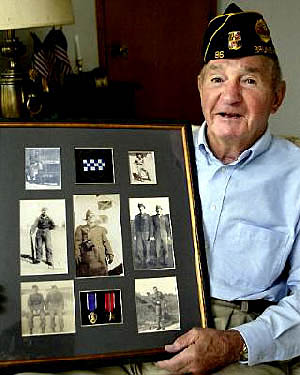Lawrence H Dallas Class 1948
Rosemont veteran recalls service
On the morning of Dec. 16, 1944, bomb blasts destroyed the front of the house where Lawrence Dallas had been asleep for barely more than an hour. The Battle of the Bulge,one of the bloodiest battles for American forces in World War II, had begun.
Dallas, then a 21-year-old soldier from Brunswick, had just completed a two-hour shift in the foxhole outside the house in Hofen, Germany.
He was tucked away in the house that served as his troop’s communication headquarters when German shells began to rain down on the wintry landscape of the Ardennes forest at 5:30 a.m.
‘‘It was a terrific shelling,” Dallas, now 84 years old, recalled from his home in Rosemont last week, where he lives with his wife of 56 years, Caroline. They have lived in the same home since 1958.
Dallas shared his war stories with a Brunswick Middle School student, via the Frederick County Veterans History, and now a description of Dallas’ service can be found in the national Veterans History Project database in the Library of Congress.
The Veterans History Project is a national effort to collect and preserve the memories of veterans from World War I to the present, through video and audio recordings.
So far, Howard Metz, director of the Frederick County Veterans History Project, said his team of volunteers has interviewed more than 125 World War II veterans in Frederick County.
A railroad brakeman by trade, Dallas’ job in the U.S. Army was to repair and lay communication and telephone wires between battalion and rifle headquarter companies. Dallas said this often put him in danger and under enemy fire.
‘‘You never knew when they were going to shell you,” he said.
Dallas’ journey to the front lines of World War II began when he was drafted in February 1943 at the age of 19.
Born and raised in Brunswick, Dallas had dropped out of high school to help support his family during The Great Depression and worked on the Brunswick railroad, as his father had. His first job was cleaning railroad cars at Union Station in Washington, D.C.
In March 1943, Dallas reported to Fort Meade for basic training and spent the next six months in Mississippi, Louisiana and Texas for additional preparation.
It was at Camp Maxey in Paris, Texas, that Dallas received a letter from home — his childhood friend who had lived down the street in Brunswick, was killed in battle. The news ‘‘worked on me a bit,” Dallas remembered.
On Sept. 29, 1944, Dallas sailed to England where he spent three weeks before crossing the English Channel to Le Havre in France, then Belgium and Germany. Dallas and the 99th Infantry Division were stationed in the area between Monschau and Hofen during the Battle of the Bulge.
One day during the conflict, Dallas said he volunteered to take another soldier’s place laying wires to a new outpost. The soldier he replaced was a married man from Baltimore with three children.
Dallas,
a
bachelor
at
the
time,
said
he
was
caught
in
the
middle
of
German
crossfire
during
the
mission.
His
sacrifice
and
bravery
that
day
earned
him
a
Bronze
Star![]() .
By
the
end
of
his
three-year
tour
of
duty,
Dallas
would
also
earn
the
Purple
Heart
.
By
the
end
of
his
three-year
tour
of
duty,
Dallas
would
also
earn
the
Purple
Heart
![]() and
the
Distinguished
Unit
Badge
and
the
Distinguished
Unit
Badge![]() for
defending
the
road
out
of Monschau.
for
defending
the
road
out
of Monschau.
For three sleepless nights Dallas narrowly escaped injury and death as he and the soldiers of the 99th Division pushed the Germans into retreat. ‘‘We chased Germans all the way to Austria,” Dallas said.
Nearly 19,000 U.S. soldiers died by the time the Battle of the Bulge was over in January 1945.
After the war ended, Dallas spent the rest of his service in Germany until he set sail on a 19-day journey from Marseilles, France, to New York. Bad weather and rough seas made everyone in his bunk seasick, he said, except him.
Dallas was honorably discharged on Jan. 1, 1946, and said he returned to Brunswick where he got his job back on the railroad after some difficulty.
He worked as a brakeman, then conductor on the Brunswick-Washington, D.C. rail lines and went back to finish high school. Although Dallas did not go to college, he said proudly that his three sons and daughter have college degrees.
Metz said Dallas tells his story with humility, which is common among World War II veterans.
Metz pointed to Dallas’ location at Elsenborn Ridge at the Battle of the Bulge’s northern front, as an example of his proximity to war. Allied troops stopped the Germans’ advance at Elsenborn Ridge, Metz said.
‘‘His story, in a way, is very humble,” Metz said. ‘‘He was in a tremendous amount of activity on the first day ... yet he played it down.”
Nominate a Neighbor
The Gazette publishes stories for the Our Neighbor series once a month. If you know someone who volunteers in their community and has an interesting story to tell, call 301-846-2100 or send an e-mail to frederick@gazette.net.
